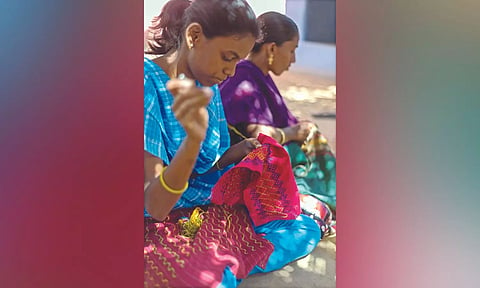

CHENNAI: Sittilingi Valley, the second southernmost settlement of the Lambadi community in India, has a rich tradition of hand embroidery, which was practised by their ancestors on clothing and various everyday items. However, this craft was lost for over two generations when they stopped wearing traditional attire.
A few years ago, with the facilitation of the Tribal Health Initiative, they successfully revived the craft. and Gammi from the community, along with Dr. Lalita, breathed life back into this craft by establishing the Porgai Artisans Association.
Porgai, a term that holds deep meaning in the Lambadi dialect, signifies ‘pride.’ These Lambadi tribe women artisans have been proudly showcasing their traditional work at various exhibitions across the country. Gayatri, the coordinator, shares with DT Next, “About 60 Lambadi women artisans create clothing that seamlessly blends Lambadi tribe embroidery with modern and contemporary styles.
The aim is to provide women with a sustainable livelihood while diligently preserving and nurturing their traditional craft. This craft is unique to the Lambadi tribe, and it is crucial to ensure that artisans receive fair daily wages for their work.”
She points out that they allow artisans to express their creativity and produce marketable products while safeguarding their original stitches and vocabulary in textile designs unique to the tribe.
“The motifs and stitches remain unchanged, and the choice of colours is mostly left to the artisans. The embroidery often draws inspiration from the valley’s abundant millets and dragonflies, as well as the birds, flowers, butterflies, and other activities in and around the village.
A majority of Porgai’s products are made from organic cotton grown in their own villages. This cotton is untouched by pesticides and unpolluted by chemical fertilisers; it is then hand-spun, hand-woven, and dyed with natural dyes.
While we don’t have a dedicated designer, we collaborate closely with the women to discuss and finalise design ideas, ensuring that our products align with market trends. Our creations are garments deeply rooted in our culture,” concludes Gayatri. The team was recently in Chennai for the Artisans Collective 2023.